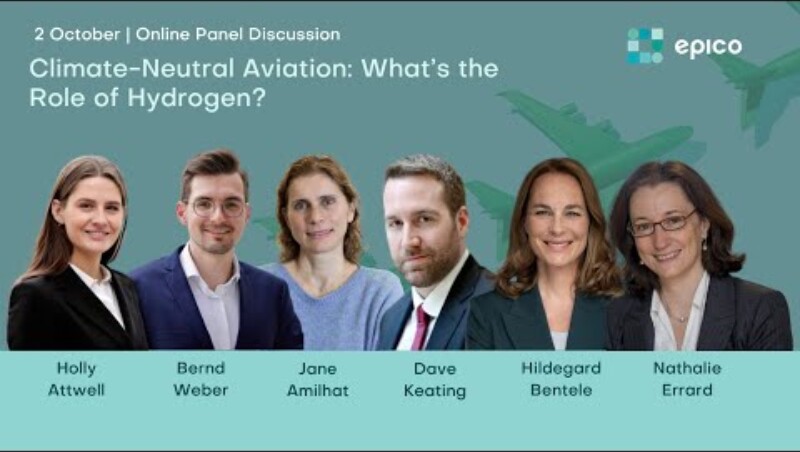
On 2 October 2024, EPICO hosted an online panel discussion on “Climate-Neutral Aviation: What’s the Role of Hydrogen?”.
Holly Attwell, Energy Policy Specialist, EPICO, opened the session by presenting EPICO’s recent Policy Report “How can hydrogen fuel climate-neutral aviation in the EU?”. She emphasised the need for support for EU innovation projects, swifter production of green hydrogen, and more preparation in terms of infrastructure needs. She also stressed the timeliness of hydrogen development and the efforts that need to be undertaken throughout the different stage of the supply chain if the EU aims to reach climate neutrality by 2050.
Nathalie Errard, Senior Vice-President and Head of EU Affairs, Airbus, emphasised aviation's key role in European connectivity, employment, and technological leadership. She supported the need for a global approach to decarbonisation but expressed scepticism about taxing kerosene and including international flights in the ETS, citing its potentially damaging impact on the Carbon Offsetting and Reduction Scheme for International Aviation (CORSIA). Additionally, Errard argued that ETS should not be expanded to include non-CO2 emissions due to a lack of scientifically proven methods for non-CO2 emissions accounting. She also highlighted the importance of supporting the Clean Aviation Joint Undertaking (CAJU) and stressed that decarbonising aviation will require more than just hydrogen. Sustainable aviation fuels (SAFs) will play a crucial role, especially during fleet renewal. Finally, Errard warned against compromising economic competitiveness, urging a balance between climate action and industrial viability.
Jane Amilhat, Head of Unit, DG RTD, European Commission, called for an urgent need to increase e-SAF production. She underscored the need to address gaps in current policies, such as the stalled revision of the Energy Taxation Directive, which continues to exempt kerosene from taxation, undermining the "polluter pays" principle. Amilhat also linked electrification efforts to broader competitiveness challenges for Europe, stressing the importance of boosting renewable energy and ensuring a strong value chain to support clean aviation's goal of reducing greenhouse gas emissions by 30% at the propulsion system level by 2030.
Hildegard Bentele, Member of the European Parliament, EPP/DE, shared insights from her work on the ReFuel EU initiative. She noted the disappointing lack of aviation focus in Commissioner-Designate Tzitzikostas' Mission Letter, expressing that targets could have been more ambitious but acknowledged the challenges posed by international competition and SAF production costs. Bentele stressed the importance of a conducive investment climate, suggesting the need for a Competitiveness Fund, and called for a more positive narrative, showcasing success stories to support public and political acceptance of aviation decarbonisation efforts.
The discussion concluded with a focus on the necessity of technological neutrality. Bentele highlighted that only carbon emissions should be the benchmark, regardless of the technology used. She underlined the importance of maintaining a robust value chain, including decommissioning, and emphasised that Europe needs to lead in creating the right conditions for an international carbon pricing regime.
Finally, Bernd Weber, CEO, EPICO, concluded by emphasising that there is no silver bullet solution for aviation decarbonisation. He highlighted the need for substantial private investment, supported by public backing, along with a clear action plan and legislative framework that includes demand-side measures. Weber also stressed the importance of climate diplomacy and international collaboration in tackling aviation emissions.
Holly Attwell's presentation on the Policy Report is available here.
Did you miss the event? You can watch the recording on YouTube!

External Content from YouTube
Please see the privacy policy of YouTube if you are loading external content.
